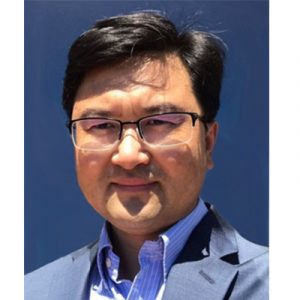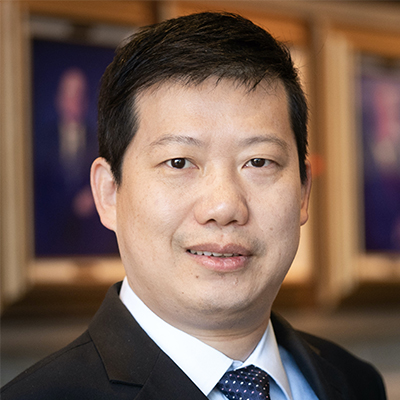Dr. Ranjani Viswanatha
Associate Professor
Jawaharlal Nehru Centre for Advanced Scientific Research, India
Date: April 14, 2021
Time: 1000h ET
Sponsor: Hiden Analytical
Dr. Ranjani Viswanatha
Associate Professor
Jawaharlal Nehru Centre for Advanced Scientific Research, India
Date: April 14, 2021
Time: 1000h ET
Sponsor: Hiden Analytical

Date: April 9, 2021
Time: 0800 Eastern US (see time chart below for other local times)
Register here (free for all): https://osu.zoom.us/webinar/register/WN_9KynqrmbTY2teo2gPeLKzw
CorroZoom website: https://fcc.osu.edu/corrozoom
A Framework for Pitting Corrosion Based on Pit Growth Stability
Gerald S. Frankel
Fontana Corrosion Center, The Ohio State University, USA (more…)
Presenter: Dr. Daniel (Dan) T. Schwartz
University of Washington
Seattle, Washington, U.S.
Date: April 8, 2021
Time: 1000h PT / 1300h ET
This is the second in the ECS Pacific Northwest Section quarterly webinar series.
 ECS and the ECS Pacific Northwest Section presented Prof. Xiulei “David” Ji’s webinar, “Aqueous Battery Chemistry: Considerations from a Reaction’s Perspective” on March 4, 2021. His answers to questions following the presentation are provided below. The webinar is now available for viewing.
ECS and the ECS Pacific Northwest Section presented Prof. Xiulei “David” Ji’s webinar, “Aqueous Battery Chemistry: Considerations from a Reaction’s Perspective” on March 4, 2021. His answers to questions following the presentation are provided below. The webinar is now available for viewing.
Xiulei “David” Ji is an Associate Professor of Chemistry at Oregon State University, U.S. His research focuses on design principles of materials chemistry for electrochemical energy storage. Ji received a 2016 NSF CAREER Award and was a Web of Science Group Highly Cited Researcher in 2019 and 2020. He is currently an Associate Editor of Carbon Energy. He completed his PhD in Materials Chemistry at the University of Waterloo, Canada, in 2009. From 2010-2012, he was an NSERC Postdoctoral Fellow at the University of California, Santa Barbara, U.S.
“Aqueous Battery Chemistry: Considerations from a Reaction’s Perspective” summarizes five dimensions of considerations for the design of storage battery chemistries from a chemical reaction’s point of view. Different types of batteries including rocking-chair batteries, dual-ion batteries, and reverse dual-ion batteries are discussed. Ji also reviews recent conceptual advances on storage batteries that employ non-metal charge carriers such as proton, ammonium, halides, and superhalides.
 The Electrochemical Society hosted Dr. Yan Yao’s live webinar, “Next-generation Batteries for Electric Vehicles and Stationary Storage” on February 24, 2021. Yao is a Cullen College of Engineering Professor at the University of Houston (UH), U.S.
The Electrochemical Society hosted Dr. Yan Yao’s live webinar, “Next-generation Batteries for Electric Vehicles and Stationary Storage” on February 24, 2021. Yao is a Cullen College of Engineering Professor at the University of Houston (UH), U.S.
Yao has led research on the fundamental study of energy storage materials and devices, spanning from solid state batteries for electric vehicles to multivalent ion batteries and aqueous batteries for grid energy storage. He has authored more than 110 journal articles with 25,000 citations and holds 10 U.S. patents. A Fellow of the Royal Society of Chemistry and Senior Member of the National Academy of Inventors and Institute of Electrical and Electronics Engineers, Yao received the Office of Naval Research Young Investigator Award (2013), UH Teaching Excellence Award (2016), UH Research Excellence Award (2018), Top 1% Clarivate Highly Cited Researcher (2018), and Scialog Collaborative Innovation Award (2018 and 2020). Yao founded the ECS University of Houston Student Chapter in 2016, and continues to serve as the chapter’s Faculty Advisor.
NOTE: Registration is required to view the webinar.
ECS thanks Hiden Analytical, the generous sponsor of Dr. Yan Yao’s webinar. (more…)
On February 10, 2021, The Electrochemical Society hosted Dr. Reza Javaherdashti’s live webinar, “Microbiologically Influenced Corrosion: Tips, Myths, Skills.” Dr. Javaherdashti is General Manager at Eninco Engineering B.V., The Netherlands. Below are Dr. Javaherdashti’s responses to questions asked in the Q&A session following his talk.
Dr. Javaherdashti has taught more than 5000 hours about electrochemical corrosion, corrosion management, and microbial corrosion to various industries worldwide. In this webinar, he discussed and explained the most important theoretical and practical aspects of microbiologically influenced corrosion (MIC) and microbiologically influenced deterioration (MID) mechanisms and how industry practitioners can recognize them.
Dr. Richard B. Kaner
Distinguished Professor
Dr. Myung Ki Hong Endowed Chair in Materials Innovation
Department of Chemistry and Biochemistry
Department of Materials Science and Engineering
University of California, Los Angeles
Date: March 10, 2021
Time: 1300h ET
Sponsor: Hiden Analytical and Comsol
Gerald Frankel, Ohio State University Professor and Journal of The Electrochemical Society Corrosion Science and Technology Technical Editor, is hosting CorroZoom, a webinar series focusing on corrosion science. The next webinar, “Corrosion of Additive Manufactured Materials” presented by Nick Birbilis, will take place on February 24, 2021, at 0800h EST.
CorroZoom Webinar
Corrosion of Additive Manufactured Materials
Nick Birbilis
Australian National University
Prof. Xiulie “David” Ji
Associate Professor
Oregon State University, U.S.
Date: March 04, 2021
Time: 1000h PT / 1300h ET
Presented by the ECS Pacific Northwest Section
The design of storage batteries entails a holistic view. This webinar summarizes five dimensions of considerations for the design of storage battery chemistries from a chemical reaction’s point of view. Electrode materials and ion charge carriers are the reactants; electrolytes are the reaction medium; battery configurations describe the operation fashion of the reactors; the electrode-ion chemical bonding reflects the nature of the chemical reaction, which affects the thermodynamic and kinetic properties of batteries. The permutations of these five dimensions result in ten unique approaches. The chemical-reaction nature of batteries can be a vantage that unifies rather than compartmentalizes a new paradigm of storage battery research. (more…)

ECS Pacific Northwest Section Officers are (from left to right) Chair Dr. Jie Xiao, Pacific Northwest National Labs; Vice-Chair Prof. Corie Cobb, University of Washington; Secretary Dr. Yun Li, Microsoft Corporation; Treasurer Prof. Shannon Boettcher, University of Oregon.
The new ECS Pacific Northwest Section, chartered by the Society’s board on October 16, 2020, has planned an active program of events for 2021.
The section seeks to connect all interested parties from academia, industry, and government and bridge a scientific gap while providing networking opportunities that could lead to new developments—and help members advance their careers. The section serves all of the universities and national labs in Washington State, Idaho, and Oregon. Dr. Jie Xiao, ECS Fellow and Battery Division Secretary, took the lead in chartering the section and now serves as its chair. She believes the section will bolster the growth of the electrochemistry and solid state science fields in the Pacific Northwest. (more…)